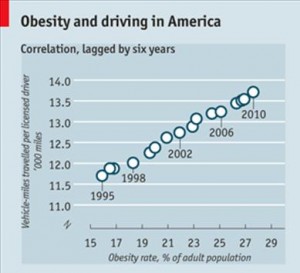More Heresy on Obesity
Obesity — its causes and consequences — is a frequent topic on this blog (and the podcast too). In the podcast, Eric Oliver argued that “the causal relationship between weight and maladies like heart disease, cancer, and even diabetes has not been firmly established.” That certainly strikes some as heresy. In a recent EconTalk podcast, noted heretic Gary Taubes lays out a well-argued position:
Taubes argues that for decades, doctors, the medical establishment, and government agencies encouraged Americans to reduce fat in their diet and increase carbohydrates in order to reduce heart disease. Taubes argues that the evidence for the connection between fat in the diet and heart disease was weak yet the consensus in favor of low-fat diets remained strong. Casual evidence (such as low heart disease rates among populations with little fat in their diet) ignores the possibilities that other factors such as low sugar consumption may explain the relationship.
Anyone for the paleo diet?

